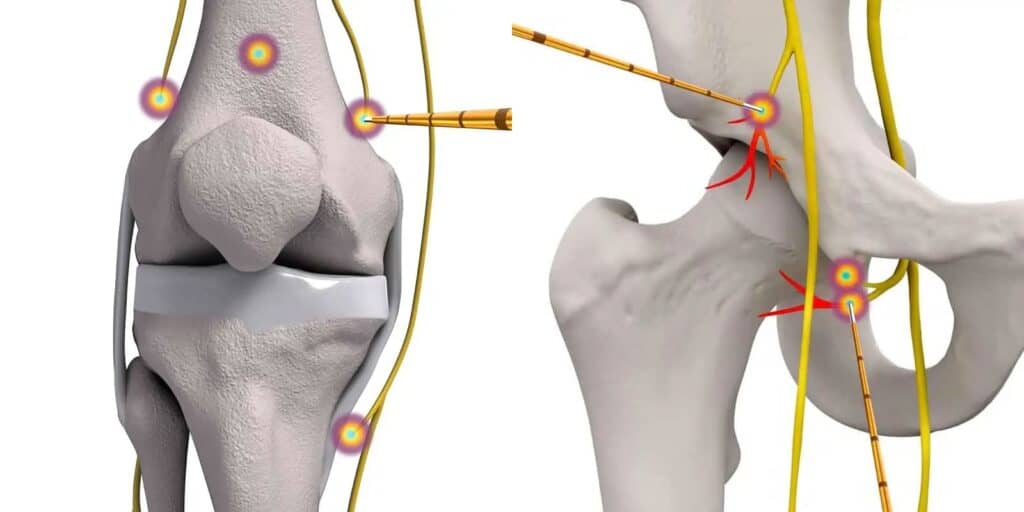Exploring Chronic Pain and Pain Management
Chronic pain is a persistent type of pain that lasts for more than three months. It can be caused by various factors, including injury, illness, or underlying medical conditions. Chronic pain can have a significant impact on a person’s lifestyle, making it challenging to work, sleep, socialize, and engage in activities they enjoy. It can also lead to mental health problems such as depression and anxiety.

(https://texasspecialtyclinic.com/blogs/chronic-pain-causes-symptoms-and-treatment/)
Pain management aims to reduce and manage discomfort and pain. The main objective of pain management is to improve a person’s quality of life by reducing or eliminating pain, enhancing overall wellbeing, and increasing function and mobility. There are many different methods and techniques in this field that can be used to treat different kinds and intensities of pain. Radiofrequency ablation for pain treatment is available in Singapore for those seeking relief from pain.
The Science Behind Radiofrequency
Radiofrequency waves are a form of energy that can be used to heat tissue. When radiofrequency waves are applied to a nerve, they cause the nerve to heat up. This heat can damage the nerve cells, which can prevent them from sending pain signals to the brain. Your surgeon will regulate the level of heat administered to the nerve so as to avoid damaging nearby healthy nerves. Radiofrequency ablation is a minimally invasive procedure, which means that it is done with small incisions and less risk of complications compared to traditional surgery.

(https://scorthogroup.com.au/our-services/radiofrequency-ablation/)
What is Radiofrequency Ablation (RFA)?
Radiofrequency ablation (RFA) is a heat-based technique used to treat chronic pain in areas like the neck, lower back, or joints when other treatments have failed. It involves directing radio waves through a needle to heat specific nerve areas, preventing pain signals from reaching the brain. In Singapore, radiofrequency ablation, also known as neurotomy, is conducted as a minimally invasive outpatient procedure, eliminating the need for overnight hospital stays. Chronic pain, which can last up to months at a time, can significantly impact daily life. Radiofrequency ablation is a valuable option for managing pain by disrupting the communication between nerves and the brain’s pain processing center, offering relief for those suffering from chronic pain.
While this treatment can yield significant benefits, its outcomes depend on a patient’s specific medical condition and their individual response to the procedure. It is important to seek guidance from a vascular surgeon to assess the suitability of radiofrequency ablation for addressing a specific chronic pain condition.
The Step-by-Step Process for Radiofrequency Ablation
- Diagnosis, Assessment, and Preparation – Before undergoing RFA, you will undergo tests to pinpoint the specific nerve responsible for your pain and confirm that it can be targeted with this procedure. This involves injecting small amounts of numbing medicine into the painful areas to assess whether your pain significantly diminishes. These areas will serve as the target sites for the RFA procedure.
- Needle Insertion – A needle is inserted through the skin into the specific site, precisely targeting the affected nerves. Local anesthesia is administered to ensure your comfort during the procedure. You will remain conscious, which allows for continuous monitoring of the treatment’s effectiveness.
- Guidance with Imaging – RFA is performed in conjunction with imaging techniques such as CT or X-ray scans. This imaging guidance enables your vascular surgeon to accurately locate the injection site and guide the needle to the precise area where you are experiencing pain.
- Activation of Radio Waves – Once the needle is correctly positioned, radio waves are activated at the targeted nerve site. These radio waves generate heat, which is a key component of the RFA process.
- Post-Procedure – After the RFA procedure, you may experience temporary weakness or numbness at the insertion site due to the local anesthesia. This sensation typically lasts for a few hours. In the days following RFA, you should notice a reduction in the pain you were experiencing.

(https://paininjuryrelief.com/radiofrequency-ablation-recovery-time/)
Effects of Radiofrequency Ablation Treatment & Pain Conditions Treated with RFA
Radiofrequency ablation can alleviate lower back pain, as well as discomfort in areas like the hips, neck, and knees, with the primary objective of reducing the pain experienced by individuals. It has also shown effectiveness in relieving arthritis-related pain. It’s important to understand that while this procedure offers relief, it is not a permanent solution to chronic pain. Even so, it can significantly enhance your comfort and overall quality of life.
To explore your options for radiofrequency ablation and determine its suitability for your condition, it’s advisable to consult with a surgeon who specializes in interventional pain management. They can provide you with a thorough evaluation and guide you through the process of making informed decisions about managing your chronic pain effectively.
Recovery Times
Immediately following the procedure, patients should not operate heavy machinery or make significant changes to their plans for the day, but they should be able to transport themselves home without any issues. A light pressure dressing is typically applied, which can be removed in the following days. Most patients can return to work within 24 hours of the surgery and resume activity gradually. However, RFA can cause some post-procedural discomfort. Those who undergo a radiofrequency ablation procedure can anticipate varying amounts of discomfort, also known as “soreness” or “achiness” following the procedure itself, or as the painful nerve fibers “die off”.
Recovery times range depending on the amount of “soreness” caused in that specific procedure. The timeline detailed below illustrates typical recovery; however, each patient progresses and responds differently, which may cause recovery rates to be longer than the average. Some patients may require more time before returning to normal activity due to factors like age, nutritional status, function, or a previously existing condition that might delay healing. Instead, physicians will continue to monitor their patients’ progress and can make adjustments to their treatment plan as appropriate. It is important to follow all post-operative instructions, including refraining from doing anything beyond the tolerated “soreness”, to avoid serious complications, as they are uncommon with this procedure. A follow-up appointment is generally scheduled two weeks following the operation. Patients will be given a long-term appointment schedule after they are released.
The Advantages of Radiofrequency Ablation in Singapore
Radiofrequency ablation is a day surgery procedure, which means that patients can return home without needing an overnight hospital stay. Additionally, this treatment has a low risk profile, which makes it a very safe choice for patients. It has been proven effective in providing long-lasting relief from chronic pain, allowing individuals to regain their quality of life. Lastly, patients can resume their regular daily activities without substantial downtime after just 24 hours.
Aftercare Tips After a Radiofrequency Ablation Procedure
After a radiofrequency ablation procedure, most patients can walk immediately and leave the centre after a brief monitoring period. Pain may last up to several days or weeks, often due to residual effects or muscle spasms. Typically, patients resume normal activities, including work, within 24 to 72 hours, and pain relief is usually noticeable within several days, though the timing may vary. It’s important to schedule a follow-up appointment with your surgeon to evaluate the procedure’s effectiveness and discuss future treatment plans and expectations.
Questions to Ask Your Vascular Surgeon About Radiofrequency Ablation
During your consultation with a surgeon, you can engage in a thorough discussion to manage your expectations about your condition and treatment. You may ask the following questions:
- How can radiofrequency ablation help alleviate my symptoms?
- Am I a suitable candidate for radiofrequency ablation?
- If I am not a suitable candidate for radiofrequency ablation, what are my other treatment options?
- What are the risks and complications associated with radiofrequency ablation?
- How long do the effects of radiofrequency ablation last?
- How should I prepare for radiofrequency ablation treatment?
- Should I follow any lifestyle considerations after treatment?
- How much does this treatment cost? Does my insurance cover this procedure?
- Aside from radiofrequency ablation, should I undergo any other treatments?
- What should I do if I still experience pain after undergoing the procedure?
FAQs:
Radiofrequency ablation (RFA) is a heat-based technique used to treat chronic pain in areas like the neck and lower back. It involves directing radio waves through a needle to heat specific nerve areas, preventing pain signals from reaching the brain.
This would depend on the treatment site and the number of procedures performed. Normally, the patient can return home after a brief monitoring period.
It begins with a diagnosis, assessment, and preparation phase, involving tests to identify the target areas for the treatment. A needle is then inserted into the affected nerve site, aided by imaging techniques, and local anesthesia is administered. Radio waves are activated at the precise location, generating heat to disable the targeted nerve. After the procedure, temporary numbness or weakness at the injection site may occur, but in the days following RFA, patients typically experience a noticeable reduction in their pain.
Radiofrequency ablation can alleviate lower back pain, as well as discomfort in areas like the hips, neck, and knees. Patients who experience chronic or long-term pain in these areas can potentially benefit from radiofrequency ablation.
Radiofrequency ablation is a safe day surgery procedure that offers long-lasting relief from chronic pain, allowing patients to return home without overnight hospital stays and resume normal activities within 24 hours, significantly improving their quality of life.
References:
- https://www.sgvascularctr.com/radiofrequency-ablation/
- https://www.hopkinsmedicine.org/health/treatment-tests-and-therapies/radiofrequency-ablation
- https://my.clevelandclinic.org/health/treatments/17411-radiofrequency-ablation
- https://www.mayoclinichealthsystem.org/hometown-health/speaking-of-health/radiofrequency-ablation-pain-relief

Dr Chen Min Qi profile
Dr. Chen Min Qi is a fellowship-trained Vascular and Endovascular Surgeon who graduated from the National University of Singapore in 2005. He subsequently completed his basic and advanced training in General and Vascular Surgery while obtaining the Member of Royal College of Surgeons of Edinburgh (MRCSed) qualification in 2010, and the Master of Medicine (General Surgery) qualification in 2015. Dr Chen was subsequently successful at the fellowship exams obtaining the Fellow of Royal College of Surgeons of Edinburgh (FRCSed) qualification in 2016.
Upon completion of his advanced surgical training, Dr Chen Min Qi joined the newly opened Ng Teng Fong General Hospital (NTFGH) as a specialist in the Vascular Surgery division. In 2018, Dr Chen was awarded the Health Manpower Development Plan (HMDP) grant from MOH to undergo further subspeciality Vascular training at the internationally renowned St Mary’s Hospital in London, United Kingdom. There Dr Chen gained further experience in surgeries on complex abdominal and thoracoabdominal aortic aneurysms, redo open repair of abdominal aortic aneurysms following failed EVAR surgeries as well as carotid endarterectomy surgery and lower limb revascularization surgeries.
Upon his return in 2020, Dr Chen Min Qi joined the newly formed Woodlands Health as head of their Vascular service, before joining his current practice at the Vascular and Interventional Centre in January 2023.
